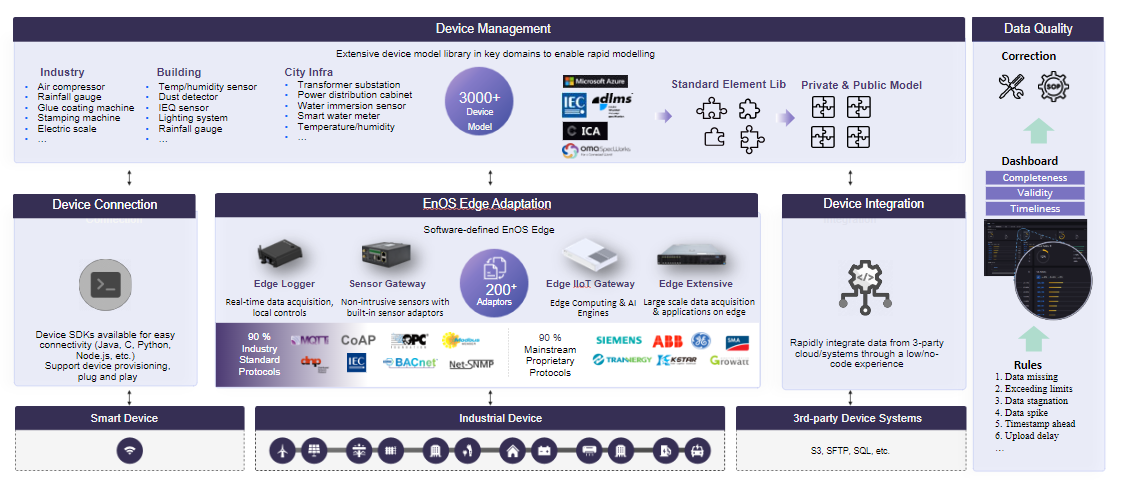EnOS Device Connection¶
EnOS Device Connection helps you quickly and securely connect physical devices to EnOS and start to transfer data, manage device lifecycle, and map the physical asset structure to the digital world. The capabilities of EnOS Device Connection on EnOS include device modeling, device connectivity, device onboarding, and device management.

Device Modeling¶
Modeling in EnOS allows assets of similar characteristics to be unified into a general model to facilitate data analytics and application processing. A model is the abstraction and digitization of the physical objects, both device and logical assets, in the physical world. It describes the characteristics of the object, its capabilities, the services it can provide, and the events that may occur.
EnOS supports the reuse and standardization of models with the public model library and supports the standardization of features across models, the building of a consistent and standard data scheme, and driving the reuse of different models and applications with the standard model feature library by providing model features based on industry standards such as IEC, ICA, and OMA. Assets need to be modeled first before they can connect to EnOS.
Device Connectivity¶
The first thing to do on an IoT platform is to connect your devices to transmit data. In EnOS, there are two main methods to connect your devices, directly or through a gateway, you can choose the method based on several factors such as the device data format, the connection protocols used by the device, and the device type.
Direct Connection¶
Smart devices can connect to and communicate with EnOS directly through 3 device protocols, namely MQTT, HTTP, or CoAP, via Wi-Fi, GPRS, 3G, or 4G signals. Such devices include devices with smart acquisition rods, such as household inverters, and household energy storage batteries and smart home devices, such as surveillance cameras, and smart thermometers and hygrometers.
Follow these tutorials to learn more about direct connection:
Connection Through Gateway¶
Another way to connect devices to EnOS is through an edge gateway device. After a device is connected to the gateway, the communication between the gateway device and EnOS will be based on the MQTT protocol. The device types that can connect to EnOS via this method include both smart devices and non-smart devices. Non-smart devices lack the ability to connect to EnOS via Wi-Fi, 3G, or 4G. Their data are first collected by the edge gateway where the gateway serves as a proxy to help the devices complete operations such as login and data transmission.
Follow these tutorials to learn more about connection through gateway:
Device Management¶
EnOS provides a full device lifecycle management as per your business needs, from the planning and design phase to the provisioning phase, servicing phase, maintenance phase, and finally the decommissioning phase. For more information, see Device Lifecycle Management.
Device Alarm Management¶
EnOS Device Alarm Management is a business processing platform that covers the entire life cycle of alarms. Alarm Management can monitor and identify abnormal conditions in connected assets to help enterprises more efficiently eliminate defects and reduce the operational risks of enterprise assets. For more information, see Alarm Management.